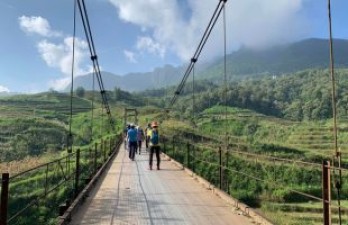The top “Dos” and “Don’ts” in Vietnam - Handspan Travel Indochina
2Worried about culture shock in Vietnam? Let’s read Handspan’s article about Vietnamese etiquettes: “Dos” and “Don’ts” when traveling to Vietnam to prepare for a favorable trip in Vietnam.
This article will tell you about these top “Dos,” “Don’ts,” and other Vietnamese etiquette below.
The top “Dos” in Vietnam
First, familiarize yourself with the top “Dos” when visiting Vietnam. Below are some things you may want to refer to.
Dress politely
Traveling to Vietnam, you are advised to dress appropriately and avoid wearing thin or see-through clothes. It is considered impolite to wear these types of clothing in public, especially in temples, pagodas, and other sacred attractions. Remember to cover your arms and legs and hide your skin from revealing as much as possible.
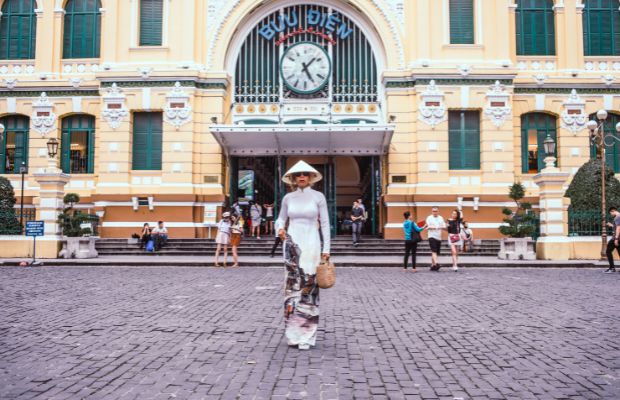
Foreign tourist wears Vietnamese Ao Dai
It’s OK to wear shorts, skirts, or crop-top shirts to bars, beaches, or at your resort. However, nudity is not encouraged, as the Vietnamese won’t put up with it and consider it offensive.
Be respectful at religious attractions
Besides wearing moderate clothes, you should also keep silent when visiting religious attractions. No one wants to be disturbed in a peaceful place. Taking off hats and shoes before entering the shrine is also a note, as wearing hats and shoes in the Buddha Hall is taboo in Vietnamese conceptions. Besides, you shouldn’t point and touch the Buddha Statue as this is considered disrespectful.
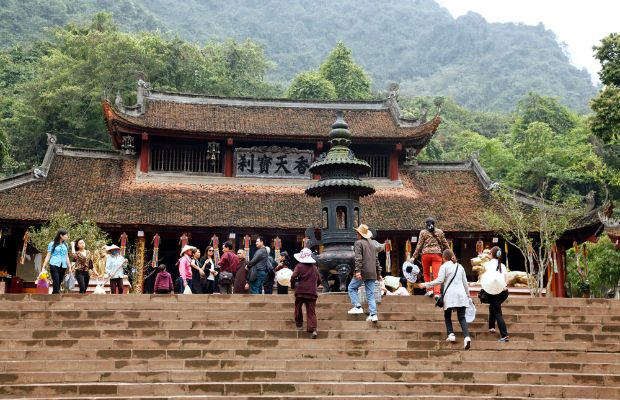
Local people in Thien Tru Pagoda, Hanoi
Learn to use some common Vietnamese words
Speaking the local language is always welcome, so as in Vietnam. Although Vietnamese is quite hard to learn, it is grateful to know some ways of salutation, like “Xin Chao” (which means “Hello” in English), “Cam on” (which means “Thank you”), “Chao Buoi Sang” (means “Good Morning”), “Chao Buoi Toi” (means “Good Evening”), etc.
Ask for permission before taking photos
Vietnamese people are pretty friendly. However, it does not mean you can take pictures at will, as not many people will feel comfortable. Therefore, make sure you ask for permission before you take photos of anyone. Besides, in many spots, local people may expect payment. If you really want to capture local people’s moment, pay it.
Try street food in Vietnam
Vietnam’s cuisines are incredibly diverse, from traditional dishes to street food. Trying street food is one of the “Dos” in Vietnam you should not miss. Vietnamese rice noodles (Pho), rice noodles with barbecue pork (Bun cha), pancake (Banh Xeo), and Banh My are some street foods you may want to try. Besides these foods, each region of Vietnam has its own specialties, so let’s visit and explore Vietnamese cuisine.
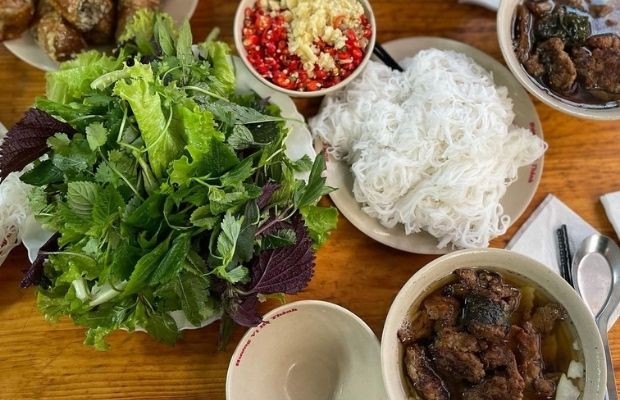
Bun cha
Bargain but keep face for the locals
When you visit a local market in Vietnam, it is better to haggle and get a fixed price for things you want to buy, as many sellers will rip off the price much higher than the item's actual value. However, when you negotiate, you should keep face with the locals and not lose your temper. If the price does not meet your expectations, just smile, say “Thank you,” and move to another stall or store. Otherwise, you can choose a supermarket if you do not want to bargain.
Have a map
As Vietnam’s streets and traffic are pretty complex and hard to find routes, it will be better if you have a printed map or offline map, or make sure you have an Internet connection to use an online map to find the direction. Besides, take a card for your accommodation to get back more easily and conveniently.
The top “Don’ts” in Vietnam
Of course, besides things to do, you also have to know about things to avoid. Let’s see these top “Don’ts” when visiting Vietnam below.
Don’t show off
Don’t show that you have money because there are many pickpockets and robbers on the street, especially in Ho Chi Minh City. Therefore, remember to remove jewelry and accessories and keep your bag in front of you to avoid being robbed.
Don’t express love in public
In Vietnam, it is not customary to see a couple expressing love on the street. Accordingly, it will be better if you do not draw attraction by kissing, cuddling, or touching your boyfriend/ girlfriend/ wife/ husband in public. Only holding hands is accepted.
Don’t get involved in illegal activities
No one wants to be penalized in a foreign country, of course. So, don’t get involved in illegal activities. In Vietnam, you are just administratively sanctioned in some cases. However, in many other situations, you may get in big trouble and even be imprisoned. For that reason, remember to avoid the issues below.
- Using drugs and cannabis
- Taking photos of the demonstrations and military infrastructure and tools
- Gambling and betting

Gambling is only accepted in some casinos
- Posting rumors about political news on social media
Don’t argue about the Vietnamese war
Coming to Vietnam, it’s OK if you would like to ask and learn about Vietnamese history. However, don’t be skeptical and argue about the Vietnamese war, as it is a sensitive topic. The war caused much damage and severe consequences for Vietnam.
Don’t give money to beggars
Walking along Vietnamese streets or tourist areas, you may catch up with many beggars. Nevertheless, don’t offer them money; this is not encouraged in Vietnam.
Don’t kiss on the cheeks for greetings
In your country, kissing on the cheeks for greeting may be a mannerliness. Nonetheless, in Vietnam, it is not familiar and even regarded as offensive if you are not in a close relationship with the person you are talking with. So, let’s avoid this! Instead, take a handshake.
Other Vietnamese etiquettes
Besides those above “Dos” and “Don’ts” in Vietnam, there are many other etiquettes you may want to follow. Let’s see some of these Vietnamese etiquettes below.
Taking off shoes when entering someone’s house
If you visit a local’s house, you should take off your shoes before you enter. This action shows respect to the host, as no one wants to have dust in their home.
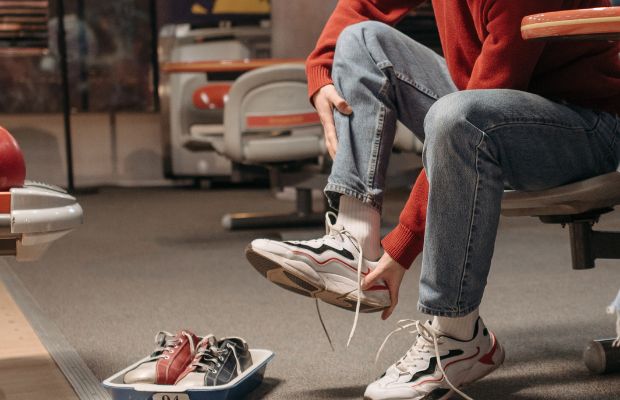
Taking off shoes when entering someone's house is an etiquette
Gift giving
Gift-giving is one of the popular activities in the daily life of Vietnamese people. You can give a present to someone on their birthday, anniversary, longevity celebration, wedding, etc. Especially, you may want to give a gift when you are invited to a local’s house.

Gift-giving is a familiar activity in the daily life of Vietnamese people
On the other hand, if you receive a gift from others, you should not open it in front of them. Let’s wait until you return to your accommodation and open your gift later.
Vietnamese etiquette in the meal
If you have a chance to join a meal with Vietnamese in their house, don’t forget to follow these politenesses below.
- Respect the elderly people
In Vietnam, the elderly are always given preference in every situation, and of course, in the meal. You should always invite the older people to eat first and wait until they start their meal.
- Note about using chopsticks
Vietnamese people use chopsticks to eat. Besides learning how to use this utensil, you may want to note some taboos when using it. Don’t put the chopsticks vertically straight up on a rice bowl; don’t play with chopsticks while eating. These actions are regarded as bringing bad luck and are highly offensive. Don’t use chopsticks to skewer food, don’t suck on the chopsticks, as it is exceptionally unsanitary. Also, don’t point the chopsticks at others because this is impolite.
- Don’t pick up and put down food, don’t bring food directly to the mouth
- Don’t look through the plate of food to find the good servings
In conclusion, you have just learned about some “Dos” and “Don’ts” in Vietnam. If you have any concerns, please do not hesitate to contact us! Besides, to learn more about Vietnam’s culture, let’s refer to our post: Traditions and customs in Vietnam.
__logo.png)
__hanoi-water-puppets.jpg)
__angkor-wat-blue-reflections.jpg)
__vientiane-buddha-park-monks.jpg)
__bagan-dhammayazika-dusk.jpg)

